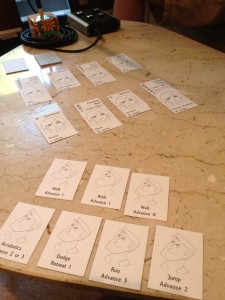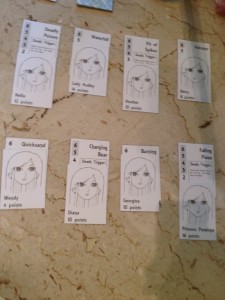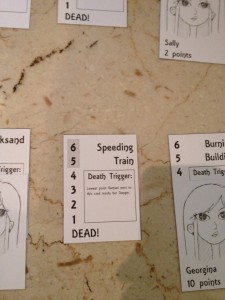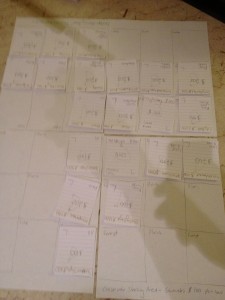Podcast: Play in new window | Download
Subscribe:
Damsels Playtest

First of all, this has been written with the assumption that you already listened to the actual play recording of our playtest of Damsels in Distress. If you haven’t listened, I think you’ll appreciate it more if you do.
Second, I apologize for the technical problem that cut the recording off early. I’m glad we managed to get the whole game in there, and that’s valuable. But I’m worried that the most helpful piece of the experience for our audience was lost when my laptop died. That’s what I get for trying to repurpose my Dad’s discarded, beat-up 2002 Toshiba Satellite(tm). What we lost was the critical analysis of the game, where the three of us talked about what was good, what was bad, and different ways the game could improve. So let’s break a few of those down.

The Good:
I still think the core concept and mechanics of the game are good. The concept – strong men saving helpless girls from certain doom – is familiar. I’d estimate it’s pretty much the core feature of 90% of the fiction that exists in our world. It’s easy for people to understand, which is a helpful thing since this is my first game. But that could also be sexist. And I’m aware of that. Which is why the game is also trying to make fun of that classic format. The artwork will go a long way toward making that work.
The main mechanics of the game are, I think, pretty solid. While the Dangers are randomly put out, the player has complete control over what he does. At the same time the choices become increasingly limited as the game moves forward. But there are no surprises. The player chooses his own fate as he goes. The real challenge becomes managing the other players as much as the Dangers. I find that exciting.
The Bad:
Above all else, the game was too short. In the three player game, it ended before things got really tricky. A week later I played a four player game, and that was even worse. The game ended after only 3 rounds. It hadn’t even begun to get tricky. The game will only be good when the Heroes have to make difficult choices about who to save and who to let die, and that can’t happen if the game ends too soon.
Whoever goes first seems to have an advantage in points. So far that has always been the case in every game I’ve played. Now, I think technically that’s just dumb luck, with high point Damsels being put out in the beginning every time. But luck or not, it doesn’t change the fact that it’s happened every time. So I need to stay aware of it. I have a couple ideas of how to even that out.

Improvements:
More cards. I’ve already re-vamped the entire deck from the ground up, expanding it from 72 cards to 100. My worry is whether that’s enough. If that’s only going to take a 4-player game from 3 rounds to 5, that’s still not good enough. But I’m going from 25 Damsel cards up to 40, so hopefully that’s a big enough jump to make a difference.
Death Trigger order. My original thought was that all Damsels who die, do so at the same time. But that confused everyone else. The last thing I want is for the game to be confusing. I think I’ve come up with an answer that not only solves that problem, but also can add some strategy to the game, and partially addresses the issue with Player 1 winning more often. I won’t know for sure until we do more testing.
These, of course, are just a few highlights of what we learned after the playtest. But the one thing that I haven’t addressed yet is the most important question of all: Is it fun?
My answer is this: Almost, but not yet. I think it can be and will be. But I’m not sure yet. I’ve got a lot more balancing to do. I’ve got a lot more playtesting to do. I’ve got a lot more talking to players to do. I NEED MORE FEEDBACK!!!
So here’s where I’m asking for help. I’m going to be bringing the newest revision of Damsels in Distress with me to Gencon. I’ve ordered a complete deck from Superior POD. I’ll have it on me at all times. If you’re at Gencon, contact me on Twitter ( @poorly_designed ) and let me know you want to play. We’ll meet up and give it a shot. That’s what Building the Game is all about. Building a game in public, shared with the community. We don’t want to do this FOR you. We want to do this WITH you.




